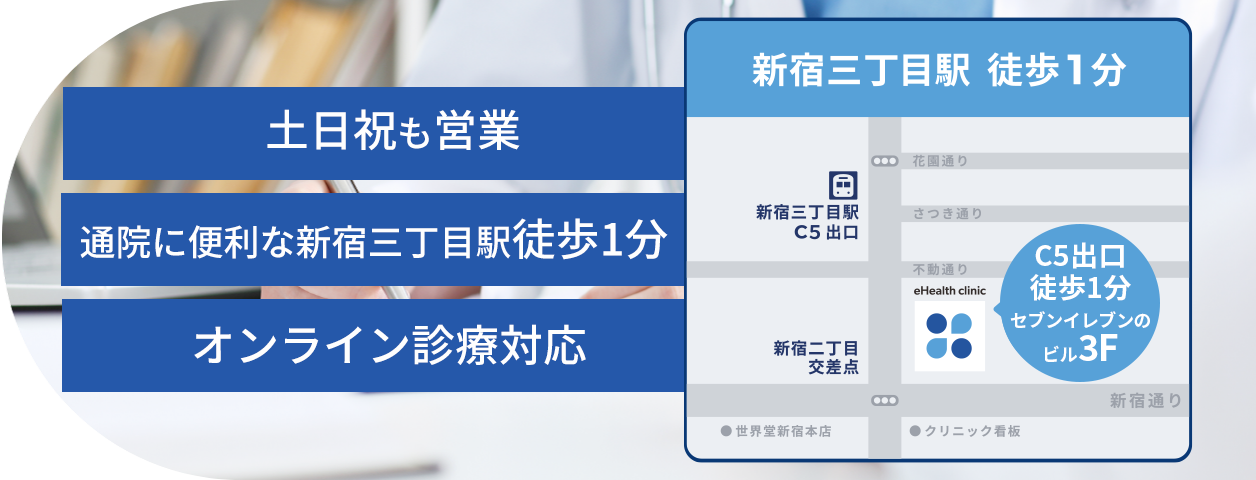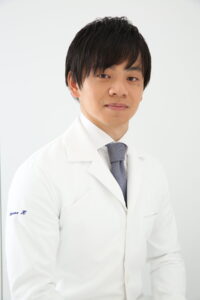【新宿】片頭痛治療薬「ナルティークOD錠」の処方ならイーヘルスクリニック新宿院|専門医による最新治療と丁寧なサポート


Chlamydia is a sexually transmitted infection (STI) caused by the bacteria Chlamydia trachomatis. STIs are infections that can be passed from one person to another through sexual contact or activities. Chlamydia mainly spreads through vaginal, anal, or oral sex. It can also be passed from a mother to her baby during childbirth, causing pneumonia or eye infections in the baby.
Chlamydia is the most common STI among Japanese people, and anyone who is sexually active can get it. However, it often does not cause any symptoms, so you may not know that you have it. You may also infect your partner without knowing it, or develop serious complications such as infertility if the infection is left untreated.
■Reservation fee 5,500 yen (tax included)
Reservation fee will be charged when you make a reservation. If you change your reservation within 3 business days of the reservation date, you will not be charged a new reservation fee.
Please note that cancellations are generally not refundable.
※Reservation fee is charged only when you make a reservation through the dedicated reservation form.
※Reservation time is only an estimate and may vary depending on other patients’ treatments, such as emergency response and urgent response.
※If you cancel a self-pay treatment reservation made through the dedicated reservation form on the day of the reservation, a cancellation fee of 100% of the cost will be charged.
Chlamydia symptoms are usually mild or absent, so many people do not realize that they are infected. The symptoms may vary depending on your sex and the part of your body that is infected.
Men often have urethritis due to infection of the urethra and may experience the following symptoms.
Pain when urinating
Discomfort in the urethra
Itching
Secretions or pus from the penis, etc.
Progressive Symptoms
As the disease progresses, the following symptoms may occur
Scrotal pain
Scrotal swelling and redness
Fever
Infertility, etc.
Women often develop cervicitis due to infection of the cervix and may experience the following symptoms
Vaginal discharge of mucus or pus
Frequent urination
Pain during urination
Pain during intercourse, etc.
Symptoms of advanced disease
As the disease progresses, the following symptoms may occur
Discomfort or pain in the lower abdomen
Pus-like discharge
Fever
Genital bleeding outside of menstruation
Infertility, etc.
Symptoms of throat infection
Swollen neck (cervical lymphadenopathy)
Sore throat, etc.
Read more about Chlamydia Symptoms
Chlamydia symptoms may lessen after a while without treatment, but if left untreated, it can have serious effects on the body, such as infertility, in both men and women. Women should also be aware of the increased risk of miscarriage and ectopic pregnancy.
As mentioned above, there are many cases where infection is asymptomatic or symptoms are mild, but it is important to consider the possibility of unknowingly infecting your partner or the fetus, and to consider seeing a urologist or other doctor if you have any concerns at all. Furthermore, if your partner is infected, you may also be infected, so even if you are asymptomatic, you should see a doctor and get tested.
Chlamydia treatment involves the use of antibacterial drugs to kill the bacteria. There are different types of antibacterial drugs, and the appropriate drug is selected based on side effects and other risks. Generally, antimicrobials are taken for about seven days, and if a woman is pregnant, she is usually treated with oral medications that have minimal effect on the fetus.
It is also considered important to treat both partners at the same time if there are partners, as they can infect each other.
What is the treatment process for chlamydia? -Types of antibacterial drugs and the length of time they are taken.
When infected with chlamydia, it is important to avoid sexual intercourse and to inform your partner of the infection if you have one.
Chlamydia is commonly transmitted through sexual contact or activities. Therefore, to prevent spreading the infection, you should avoid sexual activity as soon as you find out that you have it. Also, using condoms regularly and avoiding sexual activity with a partner who may have an infection will help prevent getting chlamydia.
Your partner may have it too, so it is important to tell them about your infection as soon as possible and to get treated together. If either of you has chlamydia, your partner should also see a doctor and get tested as soon as possible.
Some people may feel embarrassed or nervous about going to a hospital or clinic for chlamydia treatment, but there are no over-the-counter treatments available and STIs do not go away on their own, so do not ignore them and seek proper treatment at a medical facility. If you have any questions about chlamydia, talk to your doctor.
eHealth Clinic Shinjuku Clinic provides medical treatment for sexually transmitted diseases.
Although the treatment is at your own expense, we also offer online treatment, and we give the utmost consideration to patient privacy so that anyone can visit our clinic and receive treatment with peace of mind. Please feel free to consult with us if you have any concerns.
Features of eHealth Clinic’s outpatient clinic for sexually transmitted diseases
We are available for same-day treatment after examination.
We are open until 8:00 p.m. on weekdays and on weekends and holidays.
We also provide free online treatment.

We will send you a test kit and medicine by mail. The test kit and medicines will be sent to you by mail. The results will be returned in about one day.
The cost of the free treatment is as follows, which includes the treatment drugs.
Genital + throat chlamydia test set 16,500 yen (tax included)
Many people may want to avoid going to a hospital or clinic for chlamydia treatment, but there are no over-the-counter medications for chlamydia. To treat chlamydia, you need to get tested at a medical facility and get a prescription for medication.
STIs, including chlamydia, do not heal on their own. Without proper treatment, the bacteria will stay in your body. If left untreated, it can cause serious problems such as epididymitis (inflammation of the epididymis), endometritis (inflammation of the lining of the uterus), and infertility.
Both chlamydia and gonorrhea are STIs caused by different bacteria. Chlamydia infections are caused by Chlamydia trachomatis bacteria, while gonorrhea infections are caused by Neisseria gonorrhoeae bacteria. Both can be passed through vaginal, anal, or oral sex and cause symptoms such as urethritis (inflammation of the urethra) and vaginitis (inflammation of the vagina). Treatment involves taking antibiotics, but tests and treatments differ for each one.
■Reservation fee 5,500 yen (tax included)
Reservation fee will be charged when you make a reservation. If you change your reservation within 3 business days of the reservation date, you will not be charged a new reservation fee.
Please note that cancellations are generally not refundable.
※Reservation fee is charged only when you make a reservation through the dedicated reservation form.
※Reservation time is only an estimate and may vary depending on other patients’ treatments, such as emergency response and urgent response.
※If you cancel a self-pay treatment reservation made through the dedicated reservation form on the day of the reservation, a cancellation fee of 100% of the cost will be charged.
https://ehealthclinic.jp/medical/outpatient-fever/
https://ehealthclinic.jp/medical/std-sti/
https://ehealthclinic.jp/medical/sleep-medicine-service/
【1 minute walk from Shinjuku Sanchome Exit C5】
Director speaks English and Chinese. Available on Saturdays, Sundays, and national holidays. Open until 20:00 on weekdays. 24-hour web reservations available.Internal medicine, nephrology, allergology, urology.
Address: Shinjuku Dori Toyo Bldg. 3F, 2-6-4 Shinjuku, Shinjuku-ku, Tokyo 160-0022, Japan
・1 minute walk from Shinjuku Sanchome Station (Exit C5) on Tokyo Metro Marunouchi Line, Tokyo Metro Fukutoshin Line and Toei Subway Shinjuku Line
・7 minutes walk from Southeast Exit of JR Shinjuku Station
・5-minute walk from Shinjuku-Gyoenmae Station (Exit 2) on Tokyo Metro Marunouchi Line
If you have any questions, please don’t hesitate to let me know.
Email:contact@ehealthclinic.jp

Hoichi Amano (M.D.,PhD)
・Administrator of eHealth clinic
・Visiting lecturer (School of Public Health,Teikyo University)
・Locum Doctor (Teikyo University Chiba Medical Center)
・Occupational health physician for several companies
• Education
2018 – 2021 Doctorate in Public Health, Teikyo University Graduate School of Public Health, Tokyo, Japan
2016-2018 Master’s Degree in Public Health, Teikyo University Graduate School of Public Health, Tokyo, Japan
2004-2010 M.D., Saitama Medical University, Faculty of Medicine, Saitama, Japan
• Certifications
Board Certified Member of the Japanese Society of Internal Medicine
Board Certified Nephrologist of the Japanese Society of Nephrology
Board Certified Member of the Japanese Society of Anti-Aging Medicine
Occupational Medicine Physician
Master of Public health
Doctor of Public health
If you have any questions or concerns, please feel free to contact us here.(We will respond during business hours.)
https://ehealthclinic.jp/contact/
■Reservation fee 5,500 yen (tax included)
Reservation fee will be charged when you make a reservation. If you change your reservation within 3 business days of the reservation date, you will not be charged a new reservation fee.
Please note that cancellations are generally not refundable.
※Reservation fee is charged only when you make a reservation through the dedicated reservation form.
※Reservation time is only an estimate and may vary depending on other patients’ treatments, such as emergency response and urgent response.
※If you cancel a self-pay treatment reservation made through the dedicated reservation form on the day of the reservation, a cancellation fee of 100% of the cost will be charged.